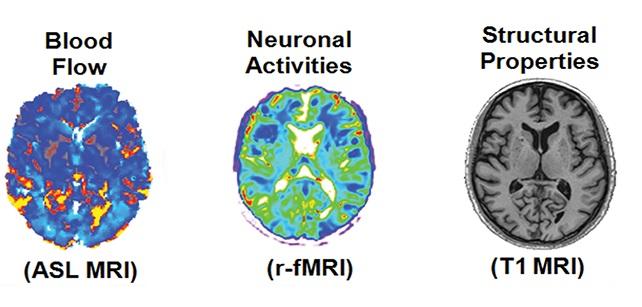Unique brain 'fingerprint' can predict drug effectiveness

The data included multiple modes of positron emission tomography (PET) and magnetic resonance imaging (MRI). Credit: Yasser Iturria Medina
Personalized medicine – delivering therapies specially tailored to a patient's unique physiology – has been a goal of researchers and doctors for a long time. New research provides a way of delivering personalized treatments to patients with neurological disease.
Researchers at the Montreal Neurological Institute and Hospital (The Neuro) of McGill University and the Ludmer Centre for Neuroinformatics and Mental Health have developed what they call a personalized Therapeutic Intervention Fingerprint (pTIF).
The pTIF predicts the effectiveness of targeting specific biological factors (brain amyloid/tau deposition, inflammation, neuronal functional dysregulation) for controlling the evolution of the patient's disease. Their results were published in the journal Neuroimage on June 14, 2018.
Lead by the study's first author, Yasser Iturria-Medina, researchers used computational brain modeling and artificial intelligence techniques to analyze the neurological data from 331 Alzheimer's patients and healthy controls. The data included multiple modes of positron emission tomography (PET) and magnetic resonance imaging (MRI). From this, Iturria-Medina and colleagues were able to categorize patients into their TIF subtypes, according to the potentially most beneficial factor-specific interventions.
The authors verified these subtypes were relevant by comparing them to the patients' individual genetic profiles. They found patients in the same pTIF subtype had similar gene expression, meaning the mechanism in which genes affect their physiology is similar. Because drugs to control disease progression would have to modify gene expression and brain properties at the same time, drugs tailored to pTIF subtypes would be much more effective than drugs designed to treat all Alzheimer's disease patients.
This is the first study to pinpoint a direct link between brain dynamics, predicted therapeutic responses, and molecular and cognitive alterations in patients. Using pTIF subtypes, drugs can be designed for a patient's unique gene expression profile and phenotypic brain characteristics, which is a major advancement in personalized medicine. It could also improve the effectiveness and reduce the cost of clinical drug trials if used as a method to select patients.
“In keeping with the tenets of personalized medicine, the introduced framework could lead to more effective medical care, decreased undesired secondary effects, and substantial reduction of pharmaceutical/clinical costs associated with clinical trials, thereby accelerating the creation-evaluation cycle of new therapeutic agents,´ says Iturria-Medina. “Our future work will focus on applying the pTIF to other neurological disorders, extensively validating it, and, importantly, making the resulting analytic tools available to the international community, via open-access platforms.”
###
This research was funded by the Government of Canada's Banting postdoctoral fellowship and Brain Canada through the Canada Brain Research Fund with the financial support of Health Canada, whereas data collection was funded by the Alzheimer's Disease Neuroimaging Initiative (ADNI) and its associated institutions.
The Neuro
The Montreal Neurological Institute and Hospital – The Neuro – is a world-leading destination for brain research and advanced patient care. Since its founding in 1934 by renowned neurosurgeon Dr. Wilder Penfield, The Neuro has grown to be the largest specialized neuroscience research and clinical center in Canada, and one of the largest in the world. The seamless integration of research, patient care, and training of the world's top minds make The Neuro uniquely positioned to have a significant impact on the understanding and treatment of nervous system disorders. The Montreal Neurological Institute is a McGill University research and teaching institute. The Montreal Neurological Hospital is part of the Neuroscience Mission of the McGill University Health Centre.
For more information, please visit http://www.
Media Contact
All latest news from the category: Health and Medicine
This subject area encompasses research and studies in the field of human medicine.
Among the wide-ranging list of topics covered here are anesthesiology, anatomy, surgery, human genetics, hygiene and environmental medicine, internal medicine, neurology, pharmacology, physiology, urology and dental medicine.
Newest articles

First-of-its-kind study uses remote sensing to monitor plastic debris in rivers and lakes
Remote sensing creates a cost-effective solution to monitoring plastic pollution. A first-of-its-kind study from researchers at the University of Minnesota Twin Cities shows how remote sensing can help monitor and…

Laser-based artificial neuron mimics nerve cell functions at lightning speed
With a processing speed a billion times faster than nature, chip-based laser neuron could help advance AI tasks such as pattern recognition and sequence prediction. Researchers have developed a laser-based…

Optimising the processing of plastic waste
Just one look in the yellow bin reveals a colourful jumble of different types of plastic. However, the purer and more uniform plastic waste is, the easier it is to…



